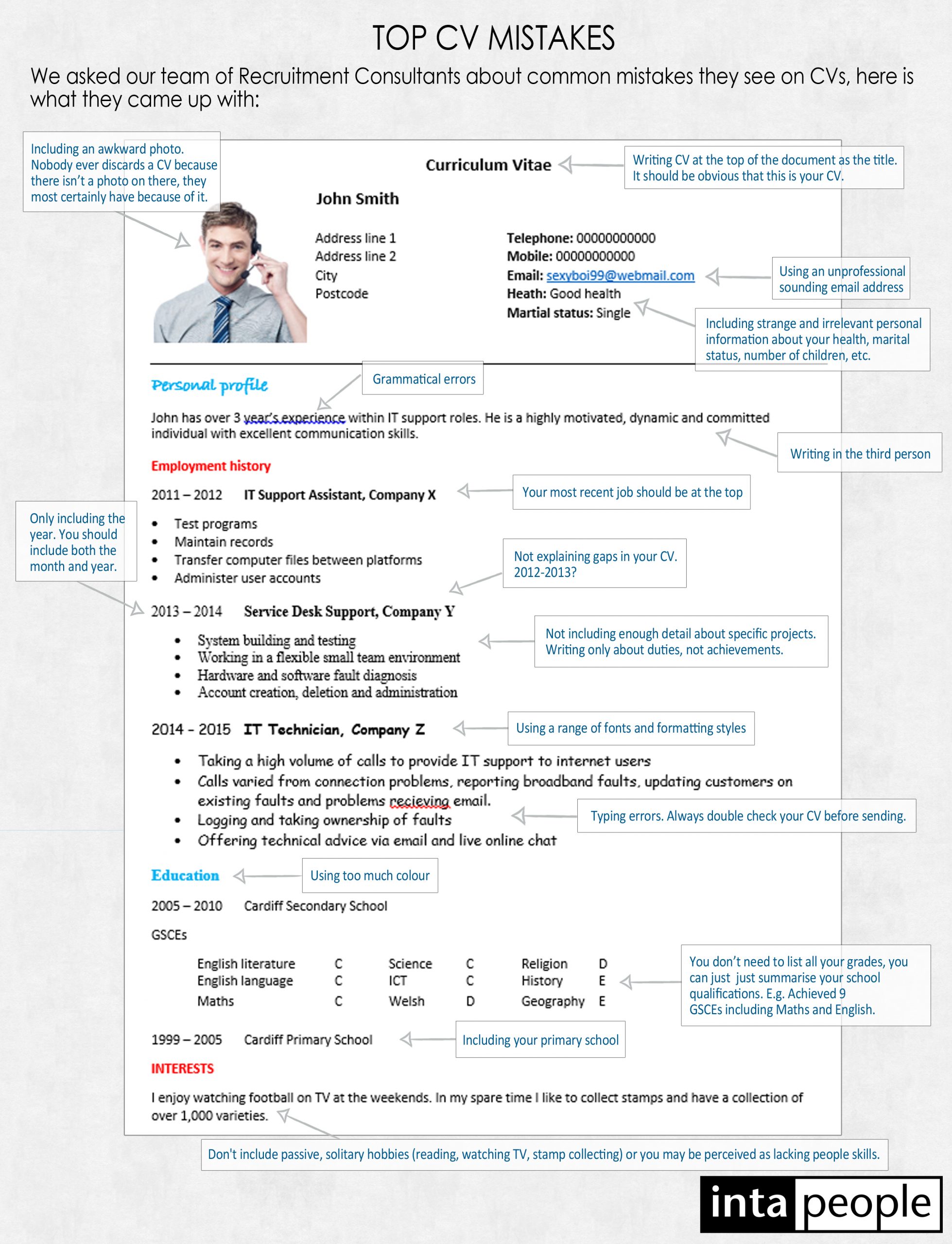Top CV mistakes
Author: IntaPeople | Date published: 03/08/20


Your CV is the first thing a potential employer will see when you apply for a new job so it is important to get it right. A well thought out CV could be the difference between getting an interview or not.
We asked our team of recruitment consultants to highlight the key mistakes they commonly see on CVs, here is what they came up with:

Section 1 – Contact details and personal profile
1. Putting CV at the top of the document as the title is unnecessary and just wastes valuable space on the page. It should be obvious from the content that the document is your CV.
2. It is difficult for employers to take you seriously if you use an unprofessional email address e.g. sexyboi99@webmail.com
3. In some countries it is custom to include a photograph of yourself but in the UK incorporating an awkward photo isn’t necessary. Nobody ever discards a CV because there isn’t a photo on there, they most certainly have because of it.
4. Strange and irrelevant personal information about your health, marital status or number of children should not be included on your CV.
5. Your contact details should appear at the top of the front page so they are easy to find.
6. Our consultants fed back that a lot of people write their personal profile in the 3rd person which makes the content harder to read, instead use the first person to talk about your personality traits and skills.
Section 2 – Employment history
7. If you apply for a job that is completely irrelevant to your skills and experience you are unlikely to be invited for an interview. If you are looking for a career change then you need to explain this and why you would be suitable for the job in your covering letter.
8. One major complaint from our consultants was that many people don’t include enough detail when describing their employment history. You need to include detail about specific projects and your achievements within those roles.
9. We have found many people update their CV with their current role without reviewing the rest of their CV at the same time. As a result we often see people using present tense for past roles.
10. When listing your employment history your most recent or present role should be first and the oldest role last. Putting your employment history in reverse order means that an employer has to search to find your latest position.
11. It is helpful to explain gaps in your work history. You don’t need to include too much detail but potential employers may wonder why you were out of work for a significant period of time. This information could be included within your covering letter instead but it shouldn’t be forgotten.
12. For each role you need to include the month and year for all the start and end dates. Including just the year doesn’t give employers an accurate idea of how long you worked in each position.
Section 3 – Education
13. You don’t need to include any information about your primary school.
14. It is possible to summarise your GCSEs rather than listing all the individual grades e.g. achieved 9 GCSEs including Maths and English.
Section 4 – Hobbies and interests
15. Unfortunately some pastimes are more interesting than others. Our consultants advise that you don’t include passive, solitary hobbies (reading, watching TV, stamp collecting) or you may be perceived as lacking people skills.
Read more: Hobbies and interests; top 5 CV mistakes
Section 5 – Formatting and presentation
16. Spelling and grammar mistakes will immediately put employers off, especially if they are looking through a number of similar CVs.
17. Use an appropriate file name when saving your CV if you plan to email it to potential employers. This will enable employers to easily find your document from other saved files. E.g. John Smith CV 2022
18. Your presentation should be clean with consistent formatting. Having multiple font styles and sizes throughout your CV can make it harder to read.
19. Don’t include a background or colourful headings unless you are applying for a particularly creative role as it can be really distracting for the reader.
20. There is a lot of discussion about CV length; some people think two pages is more than enough but others feel that 2 pages can be too restrictive. When it comes to your CV you need to think about covering all your latest roles and projects in enough detail to sell yourself without waffling. If you have a technical CV it is quite normal for CVs to be slightly longer than the 2 page norm but employers and recruiters don’t want to have to read 10 pages either!
For more CV help, download our free CV template.
